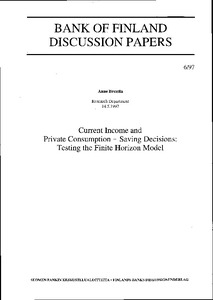Current income and private consumption : Saving decisions : Testing the finite horizon model
Brunila, Anne (14.05.1997)
Numero
6/1997Julkaisija
Suomen Pankki
1997
Julkaisun pysyvä osoite on
https://urn.fi/URN:NBN:fi:bof-20140807209Tiivistelmä
This paper considers the effects of fiscal policy on private consumption in a framework that encompasses both the conventional (Keynesian) view of fiscal policy and the Ricardian debt neutrality hypothesis.The model is built on Blanchard's stochastic model of intertemporal optimization with finitely lived consumers.As an extension to the basic framework public consumption is explicitly incorporated in the model.The model nests also the excess sensitivity hypothesis whereby the role of current income on consumption can be investigated.Empirical analyses are based on annual data from ten EU countries covering the years 1961-1994 and use the nonlinear instrumental variable GMM estimator both in country-specific and panel estimations.The tests reject clearly the Ricardian debt neutrality for majority of the countries in the sample.Moreover, deviations from Ricardian neutrality seem to arise from excess sensitivity of consumption to current income rather than from a finite planning horizon on the part of consumers.The results also suggest that in the consumers' utility functions, government consumption and private consumption tend to be unrelated or complements rather than substitutes. Keywords: private consumption, private saving, current income, fiscal policy, planning horizon
